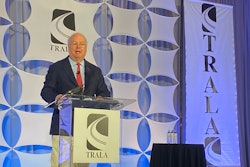
With every business and business deal, there’s paperwork. And when it comes to the federal excise tax (FET), paperwork is paramount.
Tim Reynolds, CPA, partner at DHW CPAs and Strategic Advisors, says there are exemptions to the tax, but dealers need to get and maintain the proper paperwork to support those exemptions.
“The failure to do those steps can lead to some unattended consequences,” Reynolds says. “When the IRS comes in, the first thing they look at is all your exempt sales.”
[RELATED: Got an federal excise tax-related question? Tim Reynolds, CPA, will answer questions in an April 30 webinar. Ask questions now or register for the webinar.]
One way dealers can protect their business is to audit their operations before the IRS gets the chance. That starts with checking each deal, Reynolds says.
“Do it on a frequent basis. At least once a year,” he advises. Go back through all of the transactions, but especially the exempt ones, and make sure all of the correct certificates are on hand and dated properly. They should be dated at or before the time of sale, he says. Also, make sure they’re signed.
“I could probably walk into any dealer in this country and find a bad exempt certificate,” Reynolds says.
In addition to the documentation, dealers should also look at FET calculations. If there is an excise tax calculation template several staff have access to, Reynolds says the dealership is just a keystroke away from exposure.
“If you’re not reviewing it on a regular basis, you’re not going to know,” he says.
Dealers should also hold refresher training on proper FET procedures regularly. It’s especially important when there’s a new staff member or if the dealership adds a new line of equipment or has a new part or accessory it’s carrying. Those regulations should be applied consistently across all locations, Reynolds says.
IRS Form 720 is a quarterly federal excise tax return. Reynolds says it must be filled out properly and checked to make sure it’s correct. Keep the proof the FET was paid, he says, and keep receipts. All federal excise tax deposits also should be supported by documentation so the IRS won’t have cause to add late or underpayment penalties. What is filed must also match records, he says, or the IRS will start to look more deeply.
And Reynolds adds dealers should beware of relying too much on IRS Publication 510, which is a high level overview of federal excise tax.
“What dealers and taxpayers need to understand is it’s not law,” he says. “Even though it’s published by the IRS, you can’t cite it as law.”
Furthermore, dealers should be aware that once the IRS finds a flag, they can keep digging. Once the IRS decides to audit, Reynolds says they can go back three years. That is, unless they believe they’ve found fraud or willful negligence. Then, the gloves are off and they can go back as far as they want.
Reynolds says another point of potential exposure is if the dealer’s marketing materials don’t match its exemption practices. For instance, if a trailer is sold as meeting an agricultural exemption, the marketing materials in the dealership need to say it’s designed to haul feed, seed and fertilizer, not gravel, sand, mulch or anything else.
“When you’re doing a self-audit, when you’re selling that trailer, make sure you materials say it can haul only feed, seed and fertilizer,” Reynolds says.
These are a lot of steps, Reynolds allows, and dealerships are already short on staff in many cases. It’s fine, he says, to use a third-party, such as an accounting firm with familiarity with excise tax. Otherwise, turn to the finance and accounting staff.
Reynolds says the sales staff shouldn't be ultimately responsible for calculating federal excise tax. Dealers want them out selling, he says, and they might not be fully aware of the latest rules and regulations.
"I look at the sales team as the first line of defense when working with FET," Reynolds says, cautioning there should always be a second line of checks, ideally in finance or accounting, and even a third farther up the chain. "I don't believe sales staff need to be FET experts, but I do believe they should be fairly knowledgeable with the rules and regulations when quoting or selling parts and accessories to customers."









